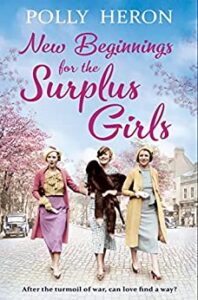 I have loved every Surplus Girls book and New Beginnings is no exception. I was drawn into Jess’s story from the moment she appeared on the page. Her position as a working woman with a responsible job, but absolutely no security of tenure when a man came along, made me really think what pioneers the career girls of the 1920s were. The suffragettes may have won us the vote, but the ability of women to prove themselves at work was just as important, although of course we had to wait another fifty years for the Equal Pay Act and even now do not have true equality in every workplace.
I have loved every Surplus Girls book and New Beginnings is no exception. I was drawn into Jess’s story from the moment she appeared on the page. Her position as a working woman with a responsible job, but absolutely no security of tenure when a man came along, made me really think what pioneers the career girls of the 1920s were. The suffragettes may have won us the vote, but the ability of women to prove themselves at work was just as important, although of course we had to wait another fifty years for the Equal Pay Act and even now do not have true equality in every workplace.
The history behind The Surplus Girls books is expertly and meticulously researched, from the big issues like these to the slang names for particular cakes. Each and every detail sings from the page, which is why you feel you are actually there, sitting on the slightly worn sofas of Wilton Road in a suitably genteel manner, chatting to old friends and new.
This is the book that pulls all the strands of the Hesketh sisters’ stories together into a really satisfying ending. No graduate of their school is forgotten in the final chapters, and Jess’s seemingly impossible dilemma is solved as well. A fabulous read.
The backdrop to the whole series is the place of women in the world of work, so I asked Polly Heron what sort of research went into it in order to create a variety of different employments in such rich detail.
 The Surplus Girls series explores the predicament faced by many young women in the aftermath of the Great War. They had grown up expected by society to marry and become housewives and mothers. Then came the war – and a generation of young men perished. Many women lost their sweethearts or fiancés while others, without knowing it, lost the men they would have married had they ever had the chance to meet. This meant that many girls now faced a future in which they would have to provide for themselves, while being regarded as ‘on the shelf’ or ‘old maids’.
The Surplus Girls series explores the predicament faced by many young women in the aftermath of the Great War. They had grown up expected by society to marry and become housewives and mothers. Then came the war – and a generation of young men perished. Many women lost their sweethearts or fiancés while others, without knowing it, lost the men they would have married had they ever had the chance to meet. This meant that many girls now faced a future in which they would have to provide for themselves, while being regarded as ‘on the shelf’ or ‘old maids’.
The world of work offered women far fewer opportunities than came the way of men. Moreover, a woman doing the same job as a man would typically earn one third less. It was legal to refuse to employ a woman simply because she was a woman and it was considered patriotic to employ a former soldier even if a female candidate would have been more suited to the job. During an interview, an unmarried woman could expect to be grilled about her marriage prospects, because should she marry, the expectation would be that she would leave in order to be a housewife. In plenty of jobs, marriage automatically meant dismissal.
In The Surplus Girls series, I have explored various jobs that would have been open to girls and women in the early 1920s. Each book has a different heroine whom the story centres around, but one of the things that links the books together is that each heroine attends a business school to learn secretarial skills.
I loved delving into the social history of the time and seeking out suitable roles for my characters – ‘suitable’ meaning appropriate to the time, not necessarily the right job for the character personally – as Nancy finds out to her cost in Christmas with the Surplus Girls. In the newly published fourth book, New Beginnings for the Surplus Girls, Jess makes a particularly interesting heroine, as she sees herself as a career woman, not an unfortunate surplus girl. She dreams of creating a successful working life for herself but has to cope with all the disadvantages that women faced at the time.
